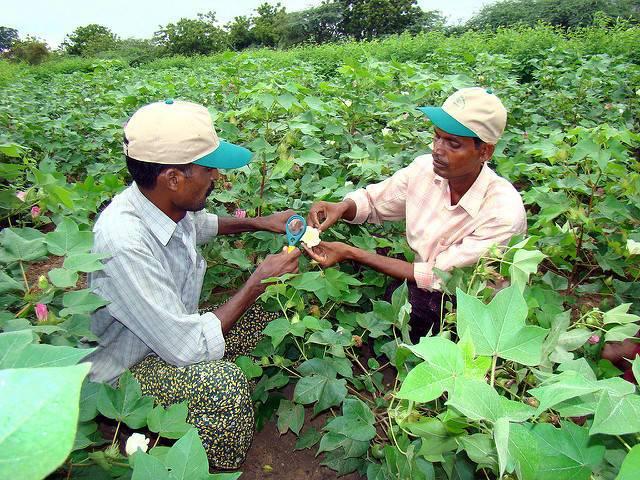
According to the United Kingdom-based NGO Fairtrade Foundation, the environmental and social footprint of fair trade cotton has one-fifth the impact of conventionally sourced cotton. And in a warning to the global textile and apparel industries, the way in which most cotton is currently produced worldwide threatens the long-term viability for this sector.
In an article posted on the foundation’s web site, Subindu Garkhel, the organization’s cotton manager, noted that the problems the global fashion industry exacts on people and planet are endemic throughout the sector’s entire supply chain. But the worst affects of the industry are imposed on the farmers that produce this coveted crop. Garkhel noted that while most global commodities are far more expensive they were than a decade ago – despite the recent slump in prices – the cost of a t-shirt at most retail chains is remarkably cheaper now than in 2007.
A quick check of the world’s fast fashion chains verify Garkhel’s claim. Visit your local Uniqlo, for example: adult cotton t-shirts at its Union Square location in San Francisco location are currently $3.99; and currently the company’s tagline is “Fresh Tees for Miles.” H&M is currently touting t-shirts and polo shirts as cheap as $5.99 – or a different shirt for each day on the week thanks to the company’s offer of free shipping for a minimum $40 purchase.
So what’s going on? According to Garkhel, while retailers have focused on improving the lot of garment workers, especially in Bangladesh, farmers have been largely left out of the equation. Much of the problem is rooted in logistics. In India, where Fairtrade Foundation’s study focused, the industry is dominated by small landholders who are at the mercy of suppliers. Garkhel claims that over a million people farm cotton, a total that exceeds the number of cocoa, coffee and sugar growers combined. Getting through to these citizens is Herculean task; and in fairness to fashion companies, this makes 100 percent traceability a challenge; nevertheless, advances in technology, not to mention these companies' profits, behooves the world's leading fashion houses to improve their performance.
To that end, Garkhel and Fairtrade foundation are pushing the global apparel industry to improve its transparency throughout its supply chain. Indeed, companies are continually improving the social and environmental performance of the factories from which they purchase their garments, especially as the four-year anniversary of the Rana Plaza collapse approaches this Wednesday. Nevertheless, too many other steps in the global cotton supply chain have been overlooked, including farming, ginning, spinning and weaving.
The study surveyed the households of small farmers across India, which depending on the source cited, alternates with China as the world’s largest producer of cotton. Fairtrade Foundation then applied an in-house valuation tool to transform that qualitative information into quantitative data in order for the foundation to make the business case to cotton suppliers, garment manufacturers and retailers. This data, which has not yet been publicly released, indicated that fair trade cotton shows a 97 percent improvement in social performance and a 31 percent increase in environmental sustainability performance.
The bottom line, according to the foundation, is that the improved wages paid for by fair trade premiums have a reach that extends far behind a boost in salary. The elimination of child labor, and a reduction in the amount of overtime worked, also result in social benefits. Furthermore, the payment of fair trade premiums also provides a more reliable source of income, as opposed to the farming of conventional cotton, which leaves farmers more vulnerable to price volatility.
And on the environmental front, fair trade cotton outpaced conventional fiber by just about every metric, including land use, water consumption, emissions and soil health. The only exception was for land use, as the study claims that fair trade cotton has a slightly lower yield per acre than conventional cotton.
In sum, Fairtrade Foundation insists that a fair and just price paid for cotton provides numerous benefits: the empowerment of more women, a better quality in the final cotton product and the expansion of education in communities that are reliant on cotton production. And for fashion companies that are only one human disaster away from losing trust, the support of a fair trade model could also enhance their brand reputation – and help ensure the long-term success of their business.
Image credit: ILEIA/Flickr

Leon Kaye has written for 3p since 2010 and become executive editor in 2018. His previous work includes writing for the Guardian as well as other online and print publications. In addition, he's worked in sales executive roles within technology and financial research companies, as well as for a public relations firm, for which he consulted with one of the globe’s leading sustainability initiatives. Currently living in Central California, he’s traveled to 70-plus countries and has lived and worked in South Korea, the United Arab Emirates and Uruguay.
Leon’s an alum of Fresno State, the University of Maryland, Baltimore County and the University of Southern California's Marshall Business School. He enjoys traveling abroad as well as exploring California’s Central Coast and the Sierra Nevadas.














